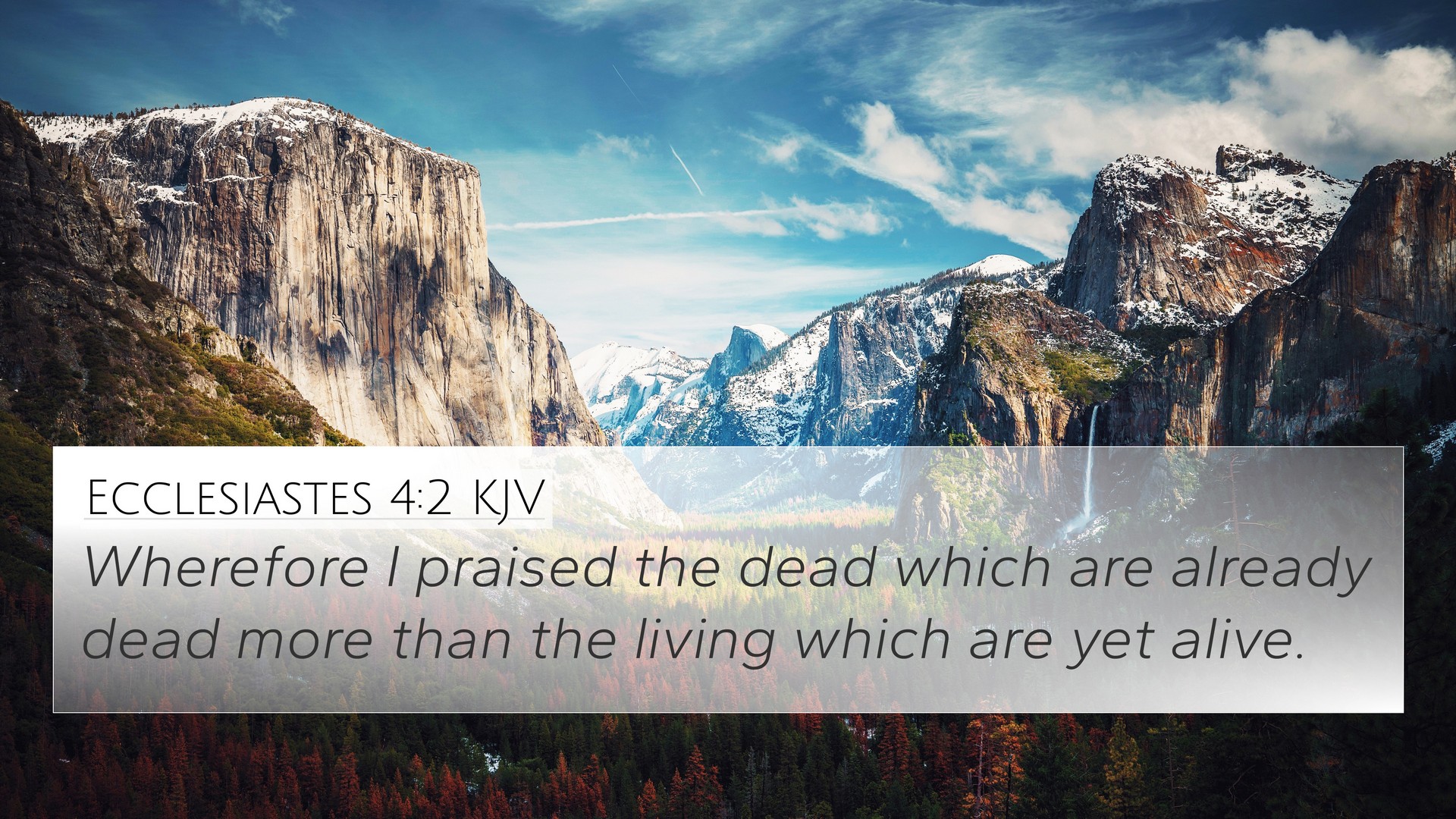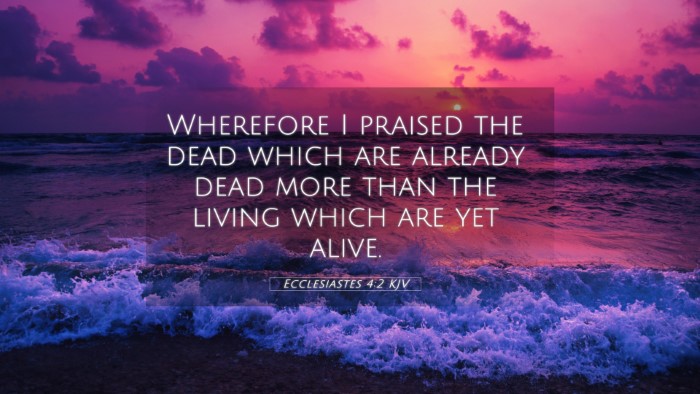Old Testament
Genesis Exodus Leviticus Numbers Deuteronomy Joshua Judges Ruth 1 Samuel 2 Samuel 1 Kings 2 Kings 1 Chronicles 2 Chronicles Ezra Nehemiah Esther Job Psalms Proverbs Ecclesiastes Song of Solomon Isaiah Jeremiah Lamentations Ezekiel Daniel Hosea Joel Amos Obadiah Jonah Micah Nahum Habakkuk Zephaniah Haggai Zechariah MalachiEcclesiastes 4:2 Similar Verses
Ecclesiastes 4:2 Cross References
Wherefore I praised the dead which are already dead more than the living which are yet alive.
Uncover the Rich Themes and Topics of This Bible Verse
Listed below are the Bible themes associated with Ecclesiastes 4:2. We invite you to explore each theme to gain deeper insights into the Scriptures.
Ecclesiastes 4:2 Cross Reference Verses
This section features a detailed cross-reference designed to enrich your understanding of the Scriptures. Below, you will find carefully selected verses that echo the themes and teachings related to Ecclesiastes 4:2 KJV. Click on any image to explore detailed analyses of related Bible verses and uncover deeper theological insights.
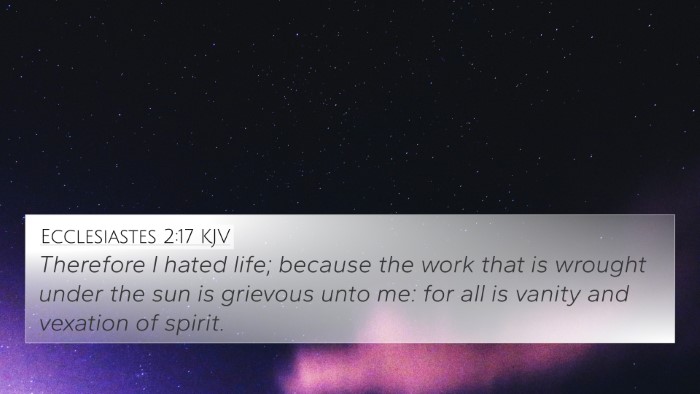
Ecclesiastes 2:17 (KJV) »
Therefore I hated life; because the work that is wrought under the sun is grievous unto me: for all is vanity and vexation of spirit.
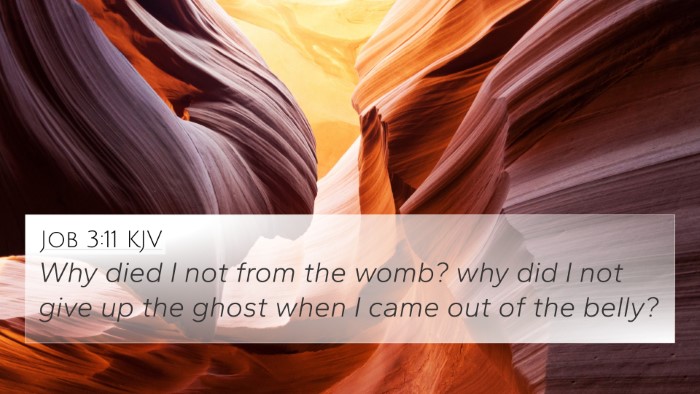
Job 3:11 (KJV) »
Why died I not from the womb? why did I not give up the ghost when I came out of the belly?
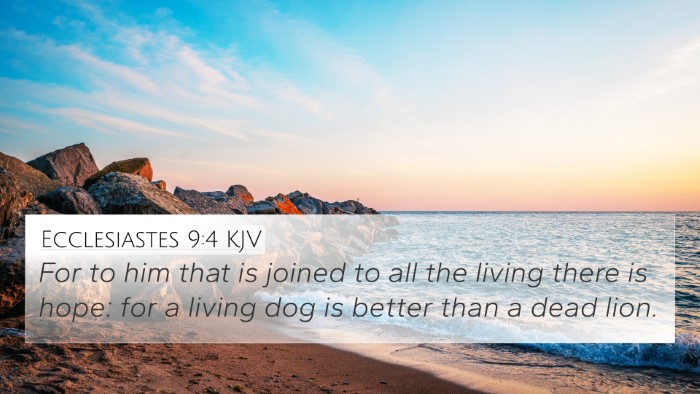
Ecclesiastes 9:4 (KJV) »
For to him that is joined to all the living there is hope: for a living dog is better than a dead lion.
Ecclesiastes 4:2 Verse Analysis and Similar Verses
Understanding Ecclesiastes 4:2
Ecclesiastes 4:2 states, "And I chose rather to be dead than to be alive, and the living which are alive, I say, that it is better to be dead than to be alive." This verse presents a deep reflection on the nature of life and death and the observations made by the author regarding human existence.
Summary of Ecclesiastes 4:2 Meaning
This passage illustrates the author's view of the struggles of life, suggesting a preference for death over the burdens that living can bring. Through this verse, the author conveys a sense of despair regarding the toil and suffering inherent in life.
Commentary Insights
Matthew Henry's Commentary
Matthew Henry notes that the author is reflecting upon the futility of labor under the sun. In this contemplative state, he observes that those who have already passed away may find peace compared to the living who are caught in the relentless cycle of labor and oppression. Henry emphasizes the importance of seeking meaning beyond mere existence, pointing to the divine purpose that gives life its true value.
Albert Barnes' Commentary
Albert Barnes views this verse as capturing the essence of human grief and contemplation. He expresses the sentiment that the troubles faced by individuals in life can be overwhelming, leading one to question the value of existence. Barnes highlights that this perspective does not advocate despair but rather encourages readers to evaluate their lives in light of eternal considerations. He suggests that finding true contentment hinges on understanding divine providence.
Adam Clarke's Commentary
Adam Clarke interprets the text as a stark acknowledgment of life's harsh realities. He points out that many may wrestle with the idea of preferring non-existence over a life filled with anguish and toil. Clarke underscores the philosophical implications of this viewpoint, prompting believers to seek solace in faith and a relationship with God, which provide the strength to endure life's hardships.
Cross-References for Ecclesiastes 4:2
- Job 3:11-12 - Job expresses a similar longing for death due to his intense suffering.
- Psalm 73:3-5 - A reflection on the prosperity of the wicked in contrast to the struggles of the righteous.
- Philippians 1:21-23 - Paul expresses a desire to depart and be with Christ, highlighting the conflict between life and death.
- Revelation 14:13 - A blessing is pronounced upon those who die in the Lord, emphasizing rest and peace in death.
- Lamentations 3:17-20 - The anguish and despair experienced by the writer resonate with the themes of Ecclesiastes.
- James 4:14 - A reminder of the brevity of life, which aligns with the sentiments expressed in Ecclesiastes.
- Matthew 6:25-34 - Jesus teaches about the worries of life, encouraging trust in God rather than despair.
Connections to Other Bible Verses
Understanding Ecclesiastes 4:2 can be enriched through thematic Bible verse connections with the following passages:
- Romans 8:38-39 - Life and death do not separate us from the love of God.
- 2 Corinthians 5:1 - The eternal perspective of life beyond the physical body.
- Ecclesiastes 3:1-2 - There is a time for everything, including a time to be born and a time to die.
Conclusions and Thematic Insights
In exploring Ecclesiastes 4:2, readers are invited to sit with the profound questions of existence. It resonates with humans who feel the weight of suffering, offering a stark yet insightful commentary about the value of life in contrast to death. Embracing these reflections can provide comfort and provoke deeper discussions on the purpose of life and the hope of eternal existence beyond earthly troubles.
Utilizing Cross-References for Deeper Understanding
Utilizing cross-reference tools can aid in exploring the connections between Bible verses. For those seeking to delve further into themes related to suffering, purpose, and existence, various resources exist, including:
- Bible concordances for thematic searches.
- Bible cross-reference guides that provide relational maps between verses.
- Cross-reference Bible study methods for systematic exploration.
- Bible chain references that link themes effectively for sermon preparation and teaching.
Final Thoughts
The melancholy expressed in Ecclesiastes 4:2 serves not only as a testament to human struggle but also invites believers into a deeper dialogue with God about life's purpose and the hope of salvation. Understanding and interpreting this verse richly through excellent biblical tools for cross-referencing brings greater clarity to its profound wisdom.
